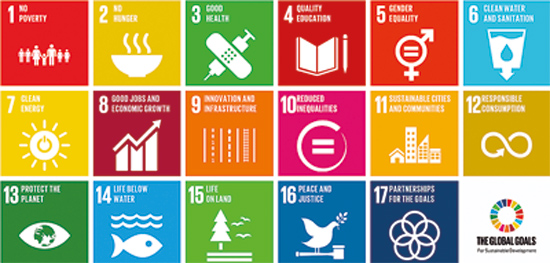News
Sri Lanka to set up Secretariat to monitor development goals
The Ministry of Wildlife and Sustainable Development is to set up a Sustainable Development Secretariat, in keeping with President Maithripala Sirisena’s pledge at the UN Sustainable Development Summit.
The initial task of the Secretariat would be to raise awareness on how Sri Lanka can develop sustainably, a spokesman for the Ministry of Wildlife and Sustainable Development said.
Addressing the Summit, President Sirisena pledged that, the Government of Sri Lanka fully supports the Post-2015 Sustainable Development Agenda in pursuance of 17 Sustainable Development Goals (SDG) to be completed by 2030.

President Sirisena addressing the UN’s Sustainable Development Summit
“While emphasising the protection of natural resources, we will also formulate a State policy on resource consumption, based on the sustainable capacity of the environment.
We will strive to ensure that the relevant policy framework is implemented within an institutional structure, based on the principles of good governance adopted by my Government,” the President further stated.
Former Vice Chairman- UN Framework on Climate Change, Prof Mohan Munasinghe, says the SGDs will be a good framework to carry forward Sri Lanka’s development in a sustainable manner. It is also important to look at them collectively to achieve better results.
He calls the previous set of goals known as Millenium Development Goals (MDG) set up in 2000 for 15 years, and expiring this year, as an abbreviated version of the real requirement, and says the SDGs would provide a better platform.
In many aspects of the MDGs, Sri Lanka led in South Asia. This is especially true in the Health sector, where indicators on child and maternal mortality rates show Sri Lanka benefiting from a well-developed public Healthcare system in which, almost 100% of births are attended by properly trained health professionals.
Likewise, in the Education sector, almost all children of primary school age are in school and 98% of youths are literate. However, Sri Lanka has not done well in Environmental Sustainability.
Likewise, on SDGs, we could have a head start on some of them and achieve more. “However, Sri Lanka should also prioritise on achieving goals that are more relevant,” advises Prof Munasinghe who is also a UN expert on Sustainable Development.
Special attention should be focused on Poverty Alleviation (SDG 1), Food Security (SDG 2), Energy (SDG 7), Education (SDG 4), minimizing Income Disparity (SDG 10) and Urban Development (SDG 11) he recommends.
President Sirisena stated that Sri Lanka will also be fully committed to dealing with SDG 13 relating to Climatic Change. “Regarding Climate Change, Sri Lanka should be more focused on Climate Adaptation and Vulnerability Reductions of Impacts of Climate change,” Prof Munasinghe emphasised.
Former Chairman of Tourist Board, Renton de Alwis, an advocate of Sustainability, says, if the President is keen on achieving sustainability, he should make if the central policy where all other policies and implementations fall around it. Mr de Alwis opposes it being called ‘Sustainable Development’, and says it should called ‘Sustainable Economy’.
“Sri Lanka should avoid following the development paths of countries such as USA or China that consumed lots of resources. Instead, follow countries such as Switzerland and Sweden which followed sustainable economies” he stated.
“Big roads, cars aplenty, big airports that no airplane lands or large conference halls where conferences are not held, should not be our priorities,” he pointed out. “Meritocracy, to govern with people selected according to merit, is also key to sustainability,” he added.
The SDGs will be effective from 2016. But, if they are not genuinely pursued, they will become mere words on paper, like how many other ambitious projects ended up in the past.
As the world pushes towards the point of no return, with many important living systems on the verge of collapse, this could perhaps be one of the last major opportunities to get our act right. Perhaps, we should start with ourselves in achieving the SDGs, and set the example for others to follow.
| The goals
2. End hunger, achieve food security, improve nutrition and promote sustainable agriculture 3. Ensure healthy lives and promote wellbeing for all ages 4. Ensure inclusive, equitable and quality education, promote lifelong learning opportunities for all 5. Achieve gender equality and empower all women and girls 6. Ensure availability and sustainable management of water and sanitation for all 7. Ensure access to affordable, reliable, sustainable and modern energy for all 8. Promote sustained, inclusive and sustainable economic growth, full and productive employment and decent work for all 9. Build resilient infrastructure, promote inclusive and sustainable industrialization and foster innovation 10. Reduce inequality within and among countries 11. Make cities and human settlements inclusive, safe, resilient and sustainable 12. Ensure sustainable consumption and production patterns 13. Take urgent action to combat climate change and its impacts 14. Conserve and use the oceans and marine resources for sustainable development 15. Protect, restore and promote sustainable use of terrestrial ecosystems, sustainably manage forests, combat desertification, halt and reverse land degradation and halt biodiversity loss 16. Promote peaceful and inclusive societies for sustainable development, provide access to justice for all, and build effective, accountable and inclusive institutions at all levels 17. Strengthen means of implementing revitalisation of global partnerships for sustainable development
|


 1. End poverty in all its forms everywhere
1. End poverty in all its forms everywhere